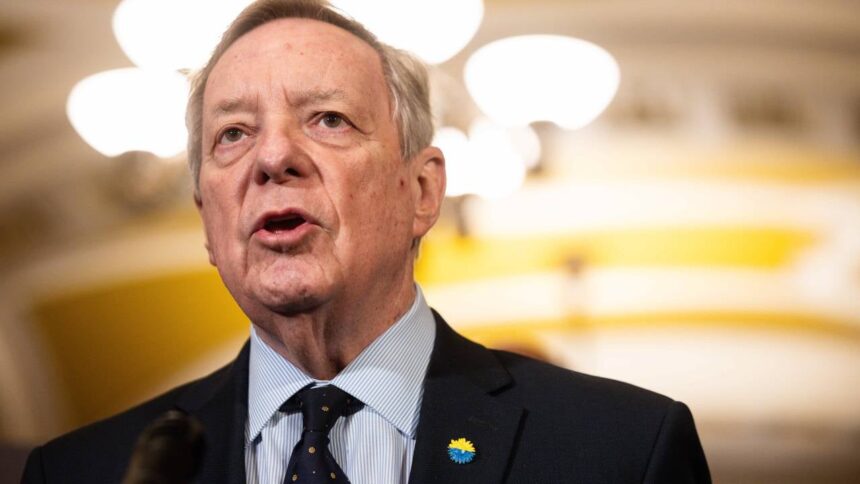Sen. Dick Durbin, an Illinois Democrat, announced on April 23 that he would retire after his current term ended in January 2027.
He’s not what you might call the Senate a “financial man,” but he’s a top Democrat on the Senate Judiciary Committee, not the Banking Committee – Durbin has influenced many legislative financial actions over his decades of service.
In particular, he helped restructure debit card processing fees in a major way with the Durbin amendment in 2010. Credit Card Interchange Landscape as a sponsor of Credit Card Competition Act.
He positions his efforts as a pro-consumer, but the outcome or expected outcome of his efforts does not always pass victory to the consumer.
What did Durbin Amendment do?
The Durbin amendment of the same name (part of the Dodd Frankwall Street Reform and Consumer Protection Act) significantly reduced the debit card processing fees merchants pay to banks each time a customer uses their card. This law was signed into law in 2010.
Among other things, this amendment limits debit interchange fees to 21 cents to a maximum of 0.05% of the transaction value (there are extra cents due to fraud protection). In fact, this reduced the average debit card processing fee by 52% (50 cents to 24 cents). According to the Center for International Law and Economics.
The merchants were pleased, as you might expect, but the net effect on consumers was not as positive as intended.
Although transaction costs have been reduced thanks to the Durbin fix, most retailers have not given their savings to consumers. In fact, only 1% of retailers cut prices; According to Richmond Fed. And with an additional blow to consumers, banks responded to reduced exchange fees by expanding their back debit card compensation program, increasing other fees (such as ATMs and overdraft fees), making it difficult to obtain a free check account.
Durbin’s revision was well intended, but the market situation recedes, preventing consumers from achieving the desired cost savings. Unfortunately, this often happens at a fee. They can become something like a carriage.
Durbin chases credit card interchange fees with credit card competition law
Recently, Durbin has been aiming to reduce credit card exchange fees.
According to Nilsson’s report, merchants love to complain about these taxes (the average is around 2.2%). The Merchant Payment Union says credit card processing fees are the highest cost for non-working workers in 2024, totaling a record $187.2 billion. Durbin is a leading architect of the Credit Card Competition Act (CCCA), which was first introduced in 2023.
The Credit Card Competition Act is trying to cut fees by promoting more competition in the payment processing market (that sounds friendly, but I am worried about unintended consequences). Credit card issuers with assets of over $100 billion will require at least two networks to be enabled for each transaction, and merchants can choose what to use. Durbin attacked Visa and Mastercard, allegedly fixed prices. The CCCA contains provisions that Visa and MasterCard are not the only networks available. For example, the card issuer could probably offer Visa and American Express. Or Mastercard and discover it. There also appears to be hope that small networks will emerge and could serve as low-cost alternatives.
Although everything sounds fine in theory, it’s not the hard cap that we saw in Dubrin Amendment’s changes to debit card interchange fees, the impact on consumers may be similar.
Supporters, including Durbin and others, have claimed that merchants would lower prices, but they didn’t do that when David Interchange fees were capped, so it seems unlikely this time.
Still, grabbing the wave of populist siege by both major political parties, the Credit Card Competition Act has gained prominent co-sponsors from both sides of the political aisle, demonstrating Durbin’s reputation as a bipartisan consensus builder.
The bill has not come to vote. It twists into a political wind. Durbin’s looming retirement could kill that momentum. Alternatively, you can fire a post-match push to Cement Durbin’s legacy as a Durbin interchange-funded fighter.
Similar to the push to Cap Debit Interchange fees, Durbin and his co-sponsors are trying to advocate for consumers via the Credit Card Competition Act. However, the financial industry does not underestimate the threat to its revenue model. Exchange rate reforms seem to be much more likely to benefit retailers than consumers. There’s no easy answer, but I think the current system is better (rewards, access to credits, etc.).
Conclusion
Durbin has become a synonym for exchange fees in the financial world, but his overall legacy is much more extensive. In a recent retrospective, Associated Press Detailed legislative achievements ranging from banning smoking on airplanes to criminal justice reform and immigration reform.
Honestly, the bank probably wants Durbin a happy retirement and he takes a replacement fee microscope with him. The year after the implementation of the debit card interchange cap, the aforementioned Kato Institute report said the bank lost revenues of between $5.1 billion and $7.4 billion. Unfortunately, most of them appeared to line up in retailers’ pockets rather than offering relief to consumers.
Have questions about credit cards? Email me to [email protected]. He will be happy to help you.










